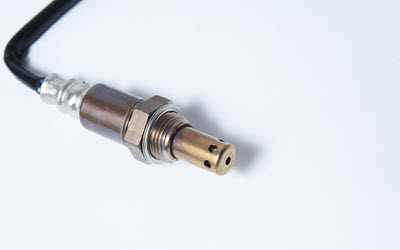The oxygen (O2) sensor in your Audi is vital to the optimal performance and fuel efficiency you have become accustomed to when you drive. This sensor, like many parts in any car, will inevitably malfunction and fail. Because it is such an important part of your driving experience, it is key to recognize the signs of failure and understand when the sensor needs to be replaced.
Function of the O2 Sensor in Audi
The O2 sensor in your Audi keeps your vehicle running smoothly. Its main purpose is to monitor how much oxygen is present in your car’s exhaust. These measurements send signals to the car’s computer to adjust the air to fuel ratio.
The Importance of O2 Sensors
Having the proper mixture of fuel and air is important because if the mix has too much oxygen (burning rich) or too little (running lean), it will negatively affect your driving experience. Among these negative experiences are decreased fuel efficiency, loss of power, and spark plug misfires. There are many symptoms of O2 sensor failure that you should take note of while driving.
When to Replace O2 Sensor in Audi
Unlike other auto parts, the O2 sensor in an Audi has no recommended time frame for replacement. It only needs replacing when it begins to fail. This makes it fairly difficult to catch the problem early before it causes any damage or negative impact on your driving performance. This is why it is vital to pay attention to the signs of O2 sensor failure.
Signs of O2 Sensor Failure
When the O2 sensor does begin to fail, you will be able to recognize some of the common warning signs that indicate that the replacement of this part is necessary.
- The check engine light may illuminate when the O2 sensor fails. The illumination of this light on the dashboard may happen for several reasons, but in conjunction with other symptoms, O2 sensor failure becomes more likely.
- Rough idling and engine stalling are more significant signs of O2 sensor failure. When the sensor does not send proper measurements to the engine, the air-to-fuel mixture cannot be adjusted and may cause various engine issues.
- Your Audi’s oxygen sensor is vital to fuel efficiency. When it malfunctions, it is likely that you will consume more fuel in a shorter amount of time. If you find yourself making more frequent trips to the gas station, O2 sensor failure could be behind this inconvenience.
- Loss of power is a common symptom of O2 sensor failure in an Audi. Because you may be using more fuel than you realized, you could have run out of gas completely or the engine may not combust due to an improper air to fuel mixture.
Powell’s Leaders in European Auto Service and Repair
Audis and other European vehicles are well-respected in the auto industry due to their high standards of performance,  comfort, and safety. When it comes to maintenance and repairs, you expect only the highest standards of care as well.
comfort, and safety. When it comes to maintenance and repairs, you expect only the highest standards of care as well.
The highly-qualified, ASE certified mechanics at Auto Assets believe in living up to dealership-quality service but without the long wait times or high costs. We use all of the latest diagnostic and repair tools, because staying current is key to providing the best service available and delivering service that you can rely on.
Auto Assets has been the leading service center in the Columbus, Dublin, New Albany, Worthington, and Powell, OH areas for over 30 years. Our auto specialists combined experience and training ensure the best quality of service that any European car owner could expect.
In addition to Audi servicing, the Auto Assets team also services these brands:
- BMW
- Jaguar
- Land Rover
- Mercedes
- MINI
- Porsche
- Volkswagen
We offer full service and maintenance to both your car and your body. While you wait, you can experience the benefits of professional, therapeutic massage therapy. Our massage clinic is open from 7 AM-7 PM by appointment.
If you would like to make an appointment for auto service, please don’t hesitate to contact the European car specialists at Auto Assets at your earliest convenience.
* Audi Car image credit goes to: tomeng.
 356 W Olentangy St, Powell, OH 43065, United States
356 W Olentangy St, Powell, OH 43065, United States 614-793-1050
614-793-1050 Weekdays 8am to 6pm, Saturday 9am to 4pm, Closed Sunday
Weekdays 8am to 6pm, Saturday 9am to 4pm, Closed Sunday 356 W Olentangy St, Powell, OH 43065
356 W Olentangy St, Powell, OH 43065





